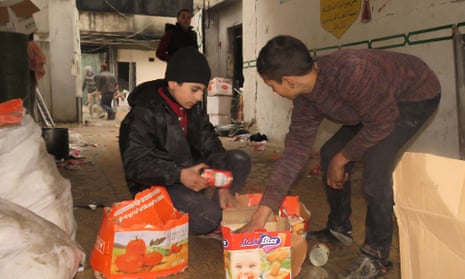The British government and parliament have failed the people of Syria, yet again. Like rabbits caught in headlights they have no plan of practical action to save civilian lives.
Yesterday’s debate in the House of Commons was all tears and talk. There was no vote to do anything. Theresa May’s absence and the lack of a government action plan signalled that Downing Street is not taking the plight of civilians seriously.
Boris Johnson’s futile rant against Bashar al-Assad and Putin looked like bluster to cover up his own lack of proposals. Yet again he offered more excuses; mistakenly claiming that aid drops are impossible because they’d put RAF planes and aircrew at risk of being shot down. In fact, aid could be delivered by pilotless drones and GPS-guided parachutes.
While all the focus is now on Aleppo, we need to remember that nearly five million Syrians are living in other besieged and hard-to-access cities, towns and villages. Aid drops are urgently needed. Britain and other states with the capacity must act now.
Last Friday, by 122 votes to 13, the UN general assembly demanded a ceasefire in Syria; an end to all sieges and the delivery of humanitarian aid to the suffering populations. This gives the UK and other countries a UN mandate to carry out air drops of food, medicine, blankets and fuel. These are desperately needed by starving, freezing and wounded civilians.
The other urgent priority right now is to protect Syrians from massacre in territory seized by Assad. We remember the killings after Yarmouk, Darayya and Homs were captured by his soldiers. This must not be allowed to happen again, as regime troops take over the rest of Aleppo.
To prevent or minimise the possibility of a slaughter ensuing, the UK should be pressing the UN to send in observers to monitor civilians, backed up by peacekeepers, as soon as possible. Their presence would deter disappearances, torture and extrajudicial murders – and these must be documented if, heaven forbid, they happen.
Our government and others should issue warrants for the arrest of parties to the conflict – primarily the Syrian government and military – who have been responsible for mass torture. We have the legal authority to do this under the UN Convention Against Torture 1984 and section 134 of the Criminal Justice Act 1988. Although getting them to trial might be difficult – at least in the short term – this would be a powerful, symbolic gesture and would send a deterrent signal to would-be torturers.
Finally, the UK government ought to take the lead in securing a UN agreement to set up a Syria war crimes tribunal, similar to those established in the wake of the Yugoslav and Rwandan conflicts. Its remit should be to prosecute all war criminals on all sides, including war crimes by the Assad and Putin regimes, Isis and other Islamist groups, the Free Syrian Army and even possible criminal acts by US-led coalition forces.
Britain should aim to bring on board other countries to back and implement these initiatives, creating an international drive for serious, concrete action to save civilian lives – and to bring to justice war criminals and perpetrators of crimes against humanity. The time for talk and hand-wringing is over. Syrians need action now.

